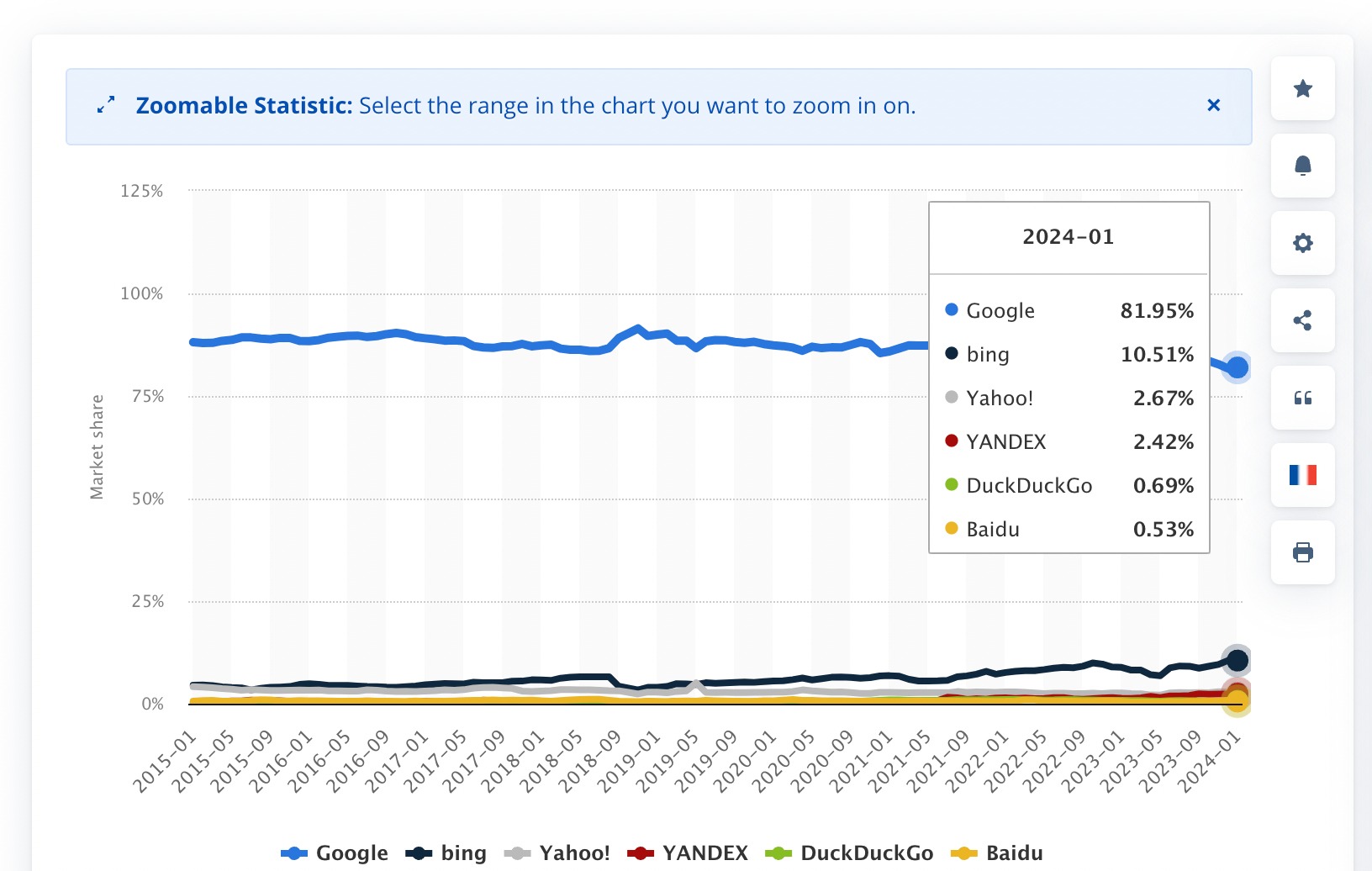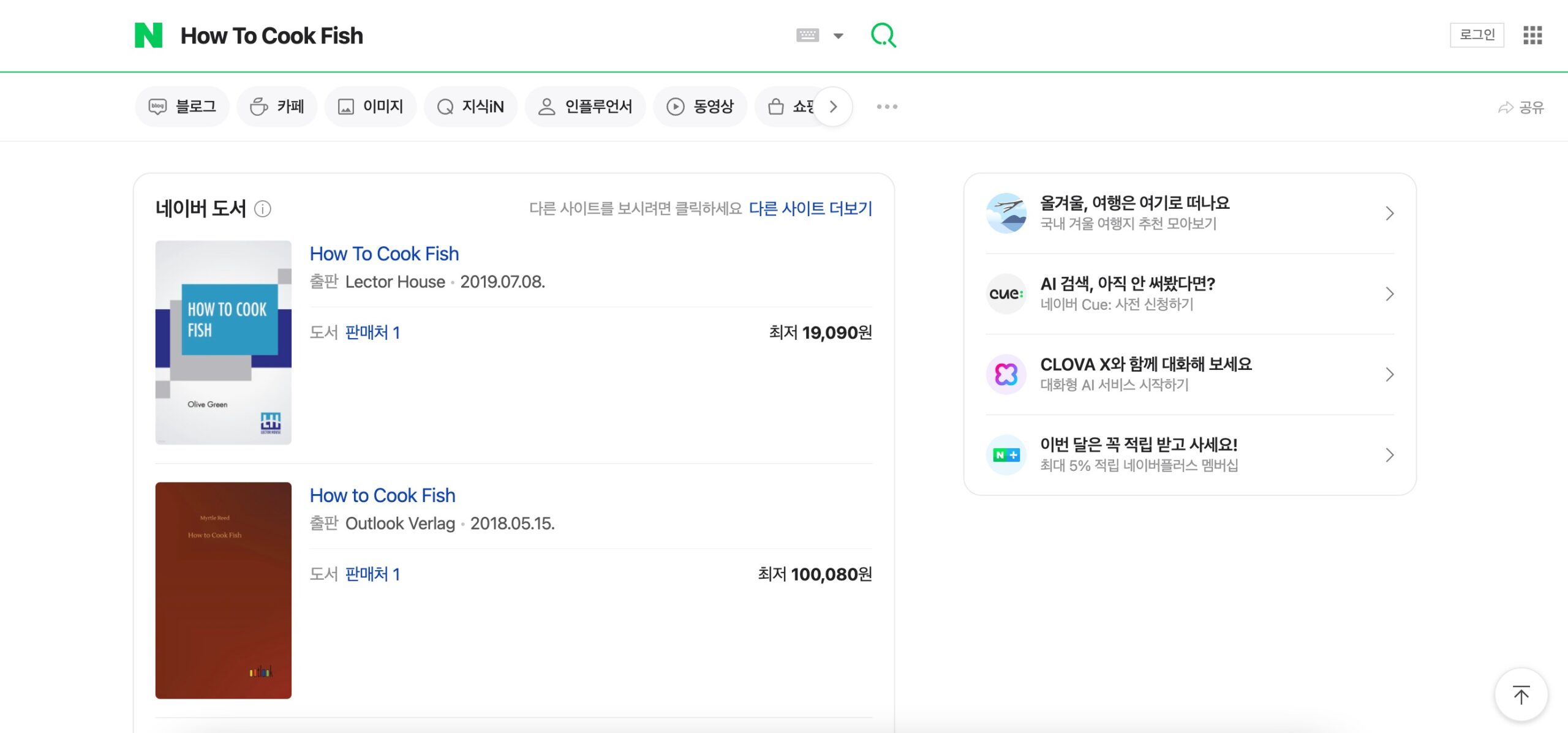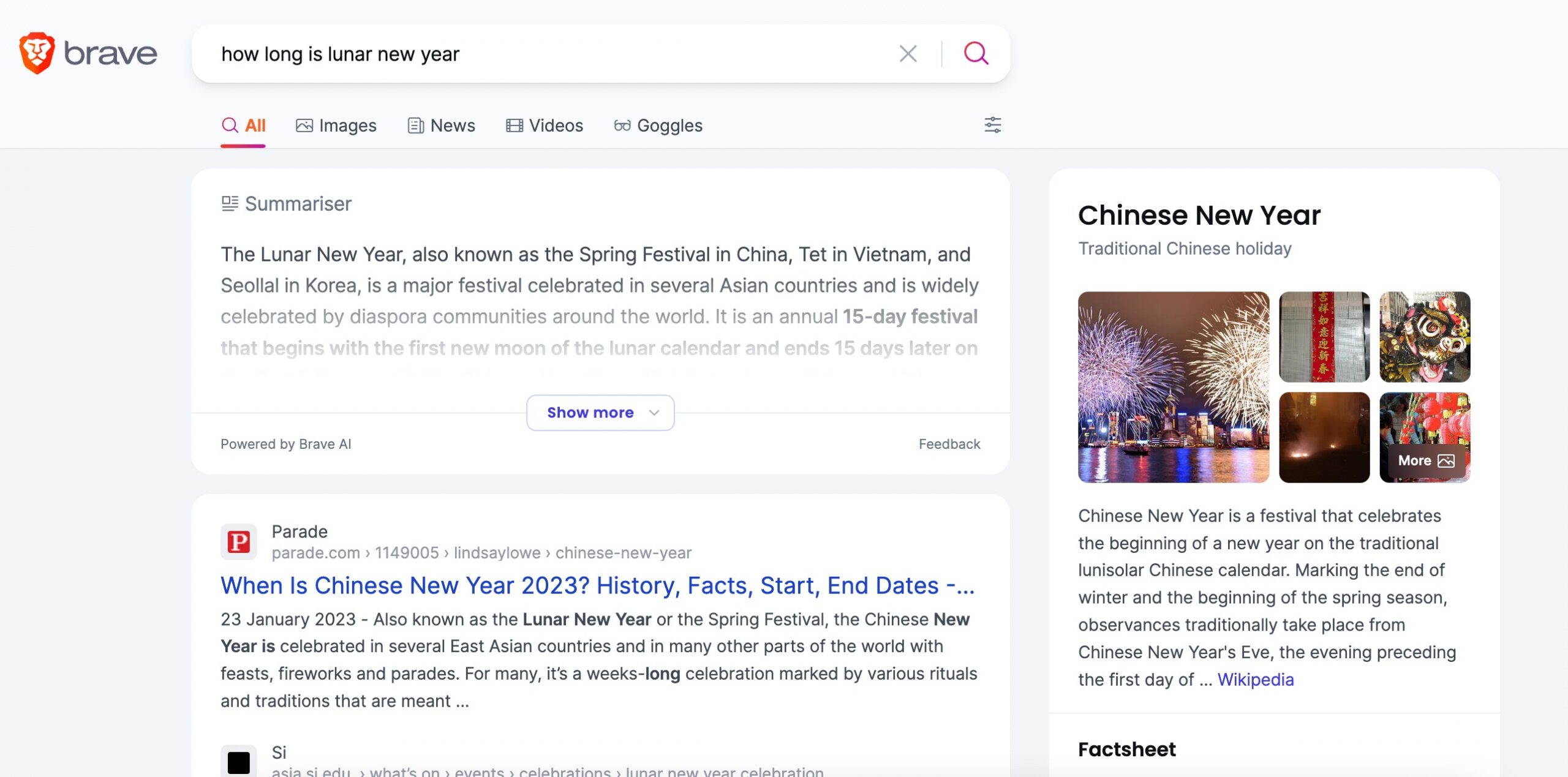When you want to learn or research about topics, mostly you often turn to search engines like Google. Isn’t it?
But did you know other search engines are designed specifically for digging deep into topics?
These search engines go beyond just finding basic information. They help you find detailed and thorough answers to your questions.
In this post, we’ll explore the best search engines for in-depth research. So, without any further ado, let’s get started.
1 What Are Search Engines?
Search engines are sophisticated software systems designed to help you find relevant information on the internet. They work by indexing vast web pages and then retrieving and displaying results based on user queries or search terms.
Search engines use algorithms to analyze and rank web pages according to their relevance to the audiences’ query. These algorithms consider factors like keywords, website authority, relevance, and user engagement metrics to determine the most appropriate results.
When a user enters a search query into a search engine, the engine scans its index to find matching web pages and then presents them in a list format, usually with the most relevant results appearing at the top. The user can then click the links provided to access the desired information.
2 Best Search Engines
Before we discuss the various types of search engines, below is the market share of the search engines. According to Statista, Google is dominating the market share with 81.95 %, followed by the other search engines.

Let us now discuss the top search engines.
2.1 Google
Google Search, commonly referred to as Google, is the most widely used global web search engine.
It was developed by Google LLC and was launched in September 1997 by Larry Page and Sergey Brin. Google has since become the most dominant search engine, with the majority of web searches conducted through its platform.
Google is extremely easy to use. You need to enter your query and click the Enter key, and Google will provide you with the most relevant results for your search.

Google employs numerous algorithms, known as ranking systems, to swiftly and accurately deliver search results to users. In addition to its search engine, Google provides a range of popular services such as Google Maps, YouTube, and Gmail.
Google displays rich snippets in search results, which provide additional context and information beyond the page title and meta description. These snippets may include features like knowledge panels, featured snippets, reviews, and ratings, enhancing the search experience for users.
In February 2023, Google introduced its AI-powered search assistant called Bard, which is now Gemini.

2.2 Bing
Bing is a web search engine developed by Microsoft and launched in 2009 as a successor to the earlier Live Search, Windows Live Search, and MSN Search platforms.

As one of the leading search engines, Bing aims to provide users with comprehensive and relevant search results across various categories, including web pages, images, videos, news, and maps.
Bing uses advanced algorithms and machine learning techniques to analyze and rank web pages, ensuring that users receive high-quality and authoritative information in response to their queries.
In addition to its core search functionality, Bing offers a range of features and tools, such as intelligent answers, visual search, and personalized recommendations, to enhance the search experience for users.
Refer to our dedicated post on indexing your content on Bing instantly.
2.3 Yahoo
Yahoo Search is a web search engine owned and operated by Yahoo, a subsidiary of Verizon Media. Initially launched in 1995, Yahoo Search has evolved over the years to become one of the prominent players in the search engine industry.

Like other popular search engines, Yahoo Search indexes web pages and provides users with relevant search results based on their queries.
While Google dominates the search market, Yahoo Search offers a distinct user experience with features such as Yahoo Answers and Yahoo News integrated into its search results. These additional features provide users with diverse content beyond traditional web pages.
Despite facing stiff competition, Yahoo continues to serve millions of users worldwide as a comprehensive search engine and a portal for accessing news, information, and entertainment content.
2.4 Yandex
Yandex is a prominent Russian multinational technology company known for its search engine, which is the most widely used in Russia.
Launched in 1997, Yandex has since become a leading player in the search engine industry, catering to users not only in Russia but also in other countries such as Ukraine, Kazakhstan, and Turkey.
Similar to other search engines, Yandex indexes web pages and provides users with relevant search results based on their queries. Yandex also has a global English version, which can be accessed at yandex.com.

However, what sets Yandex apart is its focus on understanding and serving the needs of Russian-speaking users, as well as its integration of localized features and services.
In addition to its search engine, Yandex offers a wide range of products and services, including Yandex Maps, Yandex Translate, Yandex Mail, and Yandex Disk.
2.5 DuckDuckGo
DuckDuckGo is a privacy-focused search engine that prioritizes user anonymity and data protection. Launched in 2008 by Gabriel Weinberg, DuckDuckGo distinguishes itself from other search engines by not tracking users’ search history or personalizing search results based on browsing behavior.
Instead, DuckDuckGo’s core principle revolves around respecting user privacy and delivering unbiased search results.

DuckDuckGo’s search algorithm, known as the DuckDuckBot, crawls, and indexes web pages to provide users with relevant search results without compromising their privacy.
DuckDuckGo’s clean interface and single search page make it easier to navigate than other search engines.
2.6 Baidu
Baidu is a leading Chinese-language search engine and web services company, often referred to as the Google of China. Established in 2000 by Robin Li and Eric Xu, Baidu has become the dominant search engine in China, capturing the majority share of the Chinese search market.
Baidu’s search engine functions similarly to Google, allowing users to search for web pages, images, videos, news, and more.
However, Baidu’s search results are tailored to the Chinese language and culture, providing users with relevant content and services specific to their needs.
2.7 Startpage
Startpage is a privacy-focused search engine that prioritizes user anonymity and data protection. Founded in 1998 and based in the Netherlands, Startpage aims to provide users with private and secure search experiences by not tracking or storing personal information.

Unlike many other search engines, Startpage acts as an intermediary between the user and Google’s search engine, ensuring that search queries remain anonymous and are not linked to the user’s IP address or other identifying information.
This approach allows users to access Google’s comprehensive search results without sacrificing privacy.
2.8 Naver
Naver is a leading South Korean web search engine and internet company founded in 1999 by Lee Hae-jin. It is one of the most popular search engines in South Korea, dominating the local search market.

Additionally, Naver’s search engine is optimized for the Korean language and culture, providing users with localized search results tailored to their preferences.
With its comprehensive range of services and commitment to providing users with accurate and relevant information, Naver continues to be a dominant force in the South Korean internet landscape.
2.9 Brave
Brave search engine is a privacy-focused search engine developed by Brave Software, the company behind the Brave web browser.
Launched in 2016, Brave Search aims to provide users with a private and transparent alternative to mainstream search engines.

It prioritizes user privacy by not tracking or storing user data, ensuring that search queries remain anonymous and free from targeted advertising.
Brave Search also emphasizes transparency by openly disclosing its search ranking algorithms and inviting community participation in the search index.
2.10 Shenma
Shenma is a Chinese mobile search engine developed by Alibaba Group. Launched in 2013, Shenma specializes in providing mobile-centric search services for users in China.

The search engine allows users to access e-commerce, entertainment, and other services through their mobile devices.
Shenma’s search algorithms prioritize mobile-friendly content and provide personalized search results based on user behavior and preferences. Additionally, Shenma incorporates voice search capabilities, enabling users to perform hands-free searches using voice commands.
2.11 Swisscows
Swisscows is a privacy-focused search engine developed by Hulbee AG, a Swiss-based technology company. Launched in 2014, Swisscows prioritizes user privacy and data protection, positioning itself as a secure alternative to mainstream search engines.

In addition to the search engine, Swisscows provides services like an email client, a virtual private network (VPN), and a privacy-focused messenger.
You can set up Swisscows as your default search engine in Chrome by installing its plugin.
2.12 Cốc Cốc Search
Cốc Cốc is a Vietnamese search engine developed by the Cốc Cốc Company.
Launched in 2013, Cốc Cốc Search has quickly gained popularity in Vietnam, becoming one of the leading search engines in the country after Google.

Similar to other search engines, Cốc Cốc Search indexes web pages and provides users with relevant search results based on their queries.
However, what sets Cốc Cốc Search apart is its focus on serving the specific needs of Vietnamese users, offering localized search results tailored to the Vietnamese language and culture.
2.13 Haosou
Haosou, also known as 360 Search, is a popular Chinese search engine developed by Qihoo 360 Technology Co. Ltd., a leading internet company in China.
Launched in 2012, Haosou Search quickly gained traction and became one of the top search engines in China, competing with other major players like Baidu and Sogou.
Similar to other search engines, Haosou indexes web pages and provides users with search results responding to their queries.

However, Haosou distinguishes itself through its focus on user privacy and security and its integration with other products and services offered by Qihoo 360, such as antivirus software and internet security solutions.
With its user-friendly interface, comprehensive search results, and commitment to protecting user privacy, Haosou has become a preferred choice for millions of users in China seeking reliable and secure search experiences.
2.14 AOL
AOL Search Engine is a web portal and online service provider based in the United States. Established in 1985, AOL has played a significant role in shaping the early internet landscape and remains a recognizable brand.

While AOL is primarily known for its internet service provider (ISP) and email services, it also offers a search engine that allows users to search the web for information, news, images, and more.
However, AOL’s search engine has seen a decline in popularity over the years, particularly with the rise of other dominant search engines such as Google, Bing, and Yahoo.
Despite this, AOL continues to maintain its search engine as part of its suite of online services, catering to its loyal user base and providing an alternative search option for those who prefer it.
2.15 Ask.com
Ask.com, formerly known as Ask Jeeves, is a question-and-answer-focused search engine launched in 1996. It gained popularity for its unique approach to search, allowing users to pose questions in natural language rather than entering keywords.

Over the years, Ask.com has evolved its platform to offer a wide range of search services, including web search, image search, and news search.
3 Conclusion
Each search engine offers unique strengths and caters to specific needs, whether it’s privacy, accuracy, or satisfying the search intent.
Assessing the requirements and priorities when selecting a search engine is essential, ensuring they align with the platform’s capabilities and values.
Additionally, as search engines continue to evolve with advancements in technology and user expectations, embracing innovation and adaptation is important.
By staying informed about new features, trends, and emerging platforms, you can harness the full potential of search engines to explore, discover, and learn.
If you like this post, let us know by Tweeting @rankmathseo.
- SEO Powered Content & PR Distribution. Get Amplified Today.
- PlatoData.Network Vertical Generative Ai. Empower Yourself. Access Here.
- PlatoAiStream. Web3 Intelligence. Knowledge Amplified. Access Here.
- PlatoESG. Carbon, CleanTech, Energy, Environment, Solar, Waste Management. Access Here.
- PlatoHealth. Biotech and Clinical Trials Intelligence. Access Here.
- Source: https://rankmath.com/blog/best-search-engines/



